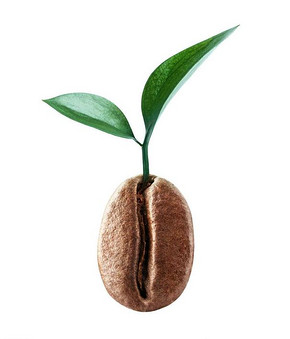Introduction to the shape and flavor characteristics of Yunnan small-grain coffee producing area
Follow the caf é (Wechat official account vdailycom) and found that Beautiful Cafe opened a small shop of its own.
[scientific name]
The small seed is Coffea arabica L., the medium grain is Coffea canephora, and the large grain is Coffea liberica.
Family and genus: coffee genus of Rubiaceae

[alias]
Small seed species are also called Arabian species, medium seed species are also called Ganfla species, and large seed species are also called Liberian species.
There are two main kinds of common: Arabica and Robusta.
Coffee is rich in protein, fat, sucrose, starch, caffeine and other substances. after being made into a beverage, coffee is rich in aroma, delicious taste and rich nutrition, so it has become the world's three largest beverages composed of tea and cocoa, and ranks first in the list. Yunnan coffee is a variant of Arabian original species, which has been cultivated for more than one hundred years after long-term cultivation.
Morphological features: small trees or large shrubs, plant height 5-8 meters. Base usually much branched, old branches gray-white. Nodes inflated, young branches glabrous. Leaves thinly leathery-ovate-lanceolate or lanceolate, apex long acuminate, base cuneate or slightly obtuse, entire or shallowly wavy, both surfaces glabrous. Cymes several clustered in leaf axils, Corolla white, fragrant. When ripe, berries are broadly oval, red, 1.2 × 1.6 cm long, and seeds 0.8-1.0 cm long. The florescence is from March to April.
Origin and distribution: native to Ethiopia or Arabian Peninsula, cultivated in Fujian, Taiwan, Guangdong, Hainan, Guangxi, Sichuan, Guizhou and Yunnan.
Important Notice :
前街咖啡 FrontStreet Coffee has moved to new addredd:
FrontStreet Coffee Address: 315,Donghua East Road,GuangZhou
Tel:020 38364473
- Prev

What are the kinds of coffee in Yunnan?
Follow the caf é (official Wechat account vdailycom) and found that the coffee varieties in Yunnan are Arabica coffee beans, which are grown in Yunnan. The varieties were first introduced in 1892 in Zhukula area, Pingchuan Town, Binchuan County, Dali Prefecture, Yunnan Province. Arabica bourbon and Arabica Tielka coffee beans were introduced, and then Kenny was introduced in 1991.
- Next

Description of Yunnan Coffee Flavor and Taste in China introduction to the characteristics of authentic Yunnan old tree iron pickup coffee beans
Yunnan coffee in China is a product of the tropics. You may not believe that the best coffee producing area in the world is in Yunnan, China.
Related
- Detailed explanation of Jadeite planting Land in Panamanian Jadeite Manor introduction to the grading system of Jadeite competitive bidding, Red bid, Green bid and Rose Summer
- Story of Coffee planting in Brenka region of Costa Rica Stonehenge Manor anaerobic heavy honey treatment of flavor mouth
- What's on the barrel of Blue Mountain Coffee beans?
- Can American coffee also pull flowers? How to use hot American style to pull out a good-looking pattern?
- Can you make a cold extract with coffee beans? What is the right proportion for cold-extracted coffee formula?
- Indonesian PWN Gold Mandrine Coffee Origin Features Flavor How to Chong? Mandolin coffee is American.
- A brief introduction to the flavor characteristics of Brazilian yellow bourbon coffee beans
- What is the effect of different water quality on the flavor of cold-extracted coffee? What kind of water is best for brewing coffee?
- Why do you think of Rose Summer whenever you mention Panamanian coffee?
- Introduction to the characteristics of authentic blue mountain coffee bean producing areas? What is the CIB Coffee Authority in Jamaica?

